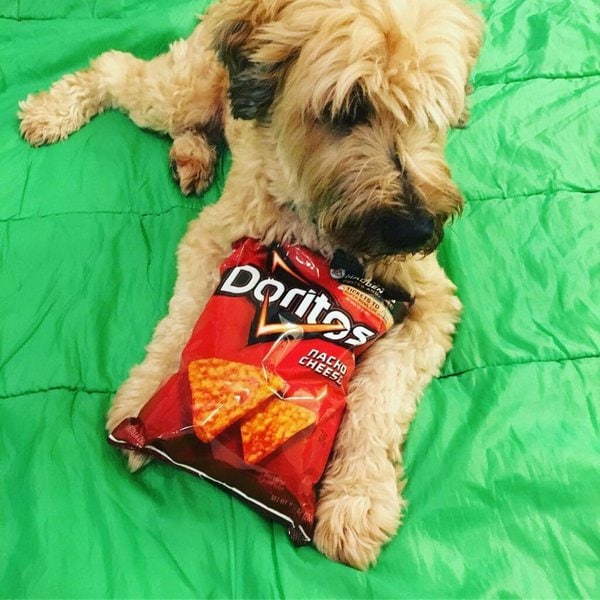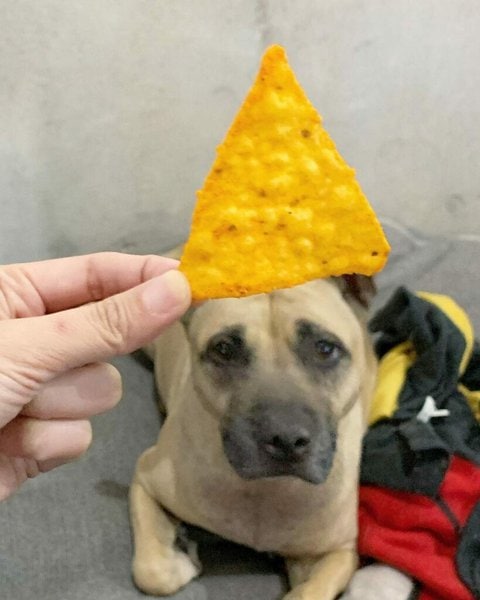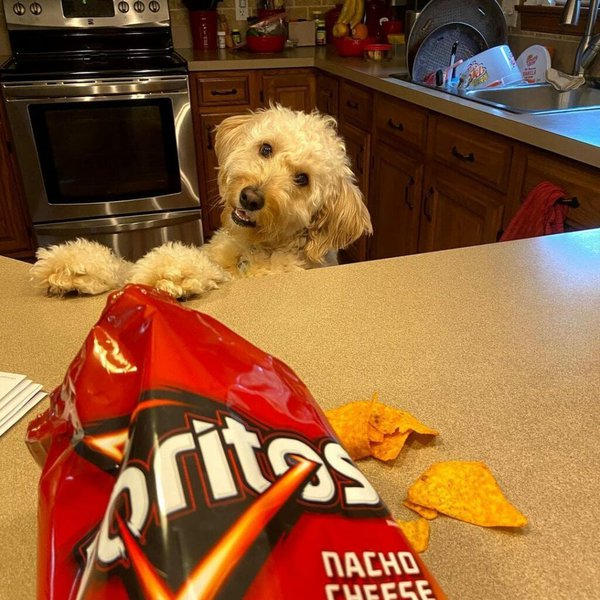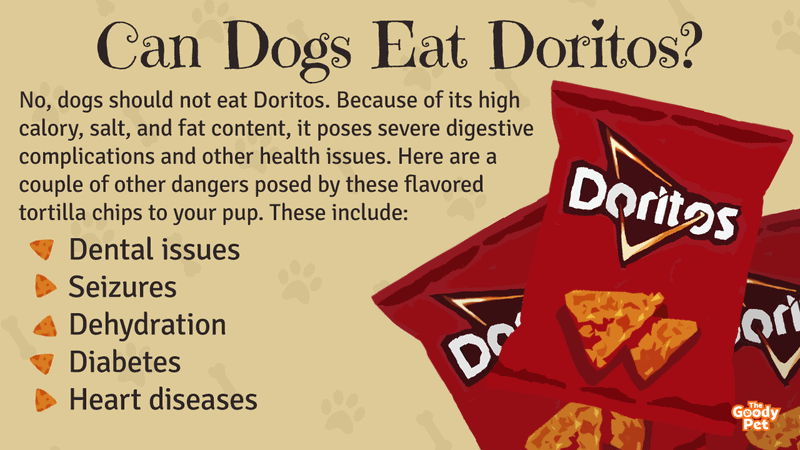It’s a beautiful Tuesday evening, and you’re out with your family to experience the thrills and spills of nacho night. On the menu are Doritos and some fried foods. Your furry friend seems interested, but you aren’t sure whether dogs can eat Doritos. Can they?
No, dogs should not eat Doritos. Because of its high calory, salt, and fat content, it poses severe digestive complications and other health issues. So, while occasional munching of this corn-based chip is permissible, you should not incorporate Doritos into the regular diet for dogs.
But what will happen if your pooch has taken a whole bag of Doritos? Can it lead to death? Get to know what one Dorito can do to your furry friend and the health hazards that come with it. In this article, you will also know what chip you should not feed your dog with apart from Doritos.
What Happens If A Dog Eats Doritos?

If your dog regularly eats Doritos, the possibility of developing stomach upsets is very high.
That’s pretty much because of the seasonings, like garlic and onions, used in preparing these flavored tortilla chips, which are incompatible with a canine’s digestive tract.
But aside from digestive complications, there are a couple of other dangers posed by these flavored tortilla chips to your pup. These include:
- The eventual death of your canine, if you continue feeding it with these chips
- Dental issues, like gum diseases and tooth decay
- Seizures
- Dehydration due to its high salt content
- Diabetes
- Pancreatitis due to the added colorings in the chips
- Heart diseases
- Unhealthy weight gain
- Frequent illness and a general decline in activity levels
Are Doritos Baked Or Fried?
Doritos are both baked and fried. As a corn-based chip, its journey into becoming the crunchy flavored snack loved by many begins with spending some time in the water and getting cooked for a few minutes.
Once the kernels are well-soaked and cooked, they are washed and ground to form a dough. Producers of Doritos can choose to cut this dough into whatever shape they like, but the most common is a triangular shape.
Manufacturers first bake it before frying it to make a crunchy and perfect Dorito from the dough. Adding flavors is the next stage, and this is where one Dorito variety may differ from the other. Usually, each side of the Dorito triangle gets a different flavor, so dogs should not be eating it regularly.
Almost everyone who has ever tasted Doritos yearns for another bite. And that can include your four-legged friend too. But why is this tortilla chip so addictive? See the answer below.
Why Are Doritos So Addictive?
Doritos are addictive because they are engineered to be so. The chip’s recipe was conceived to ensure that no single flavor dominates the other. Your dog, therefore, doesn’t feel satisfied and will always long for more.
Furthermore, monosodium glutamate (MSG), an additive known to boost appetite and make foods taste more attractive, is included as one of the first ingredients on the label. So think again if you believed “Dorito breath” was just a coincidence.
The citric and lactic acid content also keeps you salivated and set up to keep eating. It doesn’t even feel like the chip is addictive, as its vast fatty component makes it disappear quickly in your mouth.
The lingering savory flavor is an example of a marketing strategy known as “extended hang-time flavor,” designed to entice snackers to return for more. So, it’s no surprise that when Doritos appear, you’re helpless.
Can Dogs Eat Doritos Cheese Supreme?

No, Doritos cheese supreme doesn’t give your furry friend tangible nutrients or health advantages due to their makeup. They contain high sugar and salts than healthy snack options, so they aren’t suggested for dogs to consume.
Because Doritos are generally inconsistent, there is the possibility that its shards will become lodged in your dogs’ throats. Also, if you give Doritos daily and forget to clean your pup’s teeth regularly, they may be at risk of tooth decay or gum disease.
Dogs should never be allowed to consume the dyes used to color Doritos because they can cause red blood cell breakdowns, eventually resulting in kidney damage.
Also, depending on how sensitive your dog is to food coloring, Doritos may cause gastrointestinal inflammation as a side effect.
Can Dogs Have One Dorito?
While one Dorito may not cause your pup any harm, it can be the beginning of several Doritos for your beloved pooch. You don’t want to underestimate the addictive tendency of this corn-based snack.
One way to avoid the temptation of feeding these tortilla chips to your pup is to keep them out of view from it. And again, you can think about other safe options when planning a special treat for your pet.
Another variety of this chip is Doritos 3D. It once went off the market during the mid-2000s but is now back. How safe is it for your dog? Check out below.
Can Dogs Eat 3D Doritos?
No. 3D Doritos are loaded with empty calories and rich in substances such as sodium and lipids. As a result, it can cause health issues like diabetes, obesity, or even heart disease for your pooch.
When a dog consumes excessive salt, as found in 3D Doritos, the resulting symptoms can be vomiting, diarrhea, depression, tremors, high fever, or seizures.
That aside, if your dog continues to eat 3D Doritos regularly, it can be fatal. That’s because of the many complications that can result from consuming too much salt, sugar, and colorings present in this snack by your canine buddy.
Similarly, seasonings such as onions or garlic used in making 3D Doritos can cause anemia in your dog. A taste may suffice. But a high dose of onions or garlic can produce weakness, vomiting, and breathing difficulties.
Can Dogs Eat Doritos Cool Ranch?
Cool Ranch Doritos are a famous chip brand that you may want to share with your dog, especially if it is staring at you as you eat your chips. Nevertheless, Cool Ranch Doritos can be dangerous to a dog if consumed regularly.
Garlic and onion powders are hazardous to dogs, and both the Nacho Cheese and Cool Ranch varieties contain them. They also include lactose, which can irritate your dog’s stomach if it is lactose intolerant.
What Chips Are Toxic To Dogs?
Highly-processed chips with significant salt and sugar content are very toxic to dogs. The reason is that dogs’ digestive systems cannot process these things. So, if you must give your pup a chip, you must be sure of its ingredients and production process.
Some of the popular chips we humans love to eat but dogs should not eat include:

Potato chips
Sweet potatoes may benefit dogs and provide more nourishment than conventional potatoes, but your dog should not be given sweet potato chips.
This is because of the fat and seasoning that has been applied to them. In many cases, store-bought sweet potato fries are seasoned with onion and garlic powder, which are harmful to dogs.
Tortilla chips
Tortilla chips are corn-made and are very salty. That aside, maize is a common allergen for many dogs, so you might be feeding your best buddy something that will make them uncomfortable in the future.
Pringles
Your dog is welcome to play with the empty Pringle can but not with the actual Pringle. Pringles share the same issues as the other chips mentioned earlier.
There are too much salt, oil, and spices in this snack that can make your dog sick. This is one crispy treat you should not share with your dog.
Of course, a few chips are perfectly alright for canines to eat. So, if you have these chips regularly, you can share them with your pup. See those safe chips for dogs listed below.
What Chips Are Dogs Allowed To Eat?
Only chips with no or low salt are alright for dogs to consume. They include planetarians baked chips, beans, protein snack chips, and felafel organic chips.
The fact that chips are a creature comfort for humans does not diminish the fact that they should rarely be fed to canines. It would help if you did not consider them your dog’s major food.
Chips without salt are safer because you won’t have to worry about dehydration, elevated blood pressure, or sodium poisoning.
Notwithstanding, unsalted chips still contain all of the fats and oils harmful to your dog. As such, you should not feed them more than one or two chips at a time.





